Presented by Sr Faculty Member Karen Pando-Mars, MFT
This online seminar is for professionals and students in mental health and the healing arts and sciences including: Psychologists, Psychotherapists, Psychiatrists, Psychoanalysts, Social Workers, Counselors, MFTs, MD’s, Nurses, Creative Arts Therapists, and Masters & Doctoral students as well as soon-to-be licensed Interns & Trainees.
Attachment styles are strategies of defense that reveal early patterning with our caregivers that are wired into our nervous systems. As such, they serve as thresholds into the betrayal, deprivation or loss that needs to be healed in order to transform relationships with self and other. Throughout this seminar you will discover classic blind spots that occur and specific metaskills to help therapists effectively engage with each attachment style.
Establishing a secure base provides an essential foundation for exploration. When treatment is informed by the attachment style presented in each moment, we can strengthen this base and mobilize transformation.
By attending this seminar, you will learn:
- How to tailor therapeutic interventions to best attune to and motivate clients.
- When dismissive defenses generate distance, ways to build connection.
- When clients become preoccupied, how to help them focus internally and build regulation skills
- When defensive strategies loosen, observe how disorganization can reveal unresolved trauma, and how to approach the work.
- How to identify predictable blind spots in treatment and metaskills to fortify therapist self-care.
Learning Objectives:
- Identify two characteristics of avoidant attachment styles.
- Describe two ways to intervene with dismissive defenses in avoidant clients..
- Describe two characteristics of anxious/ambivalent attachment styles.
- Name two ways to regulate hyper-activation in preoccupied clients.
- Describe two characteristics of disorganization/unresolved trauma in patients.
- Name two interventions for working with a patient who is processing unresolved trauma.
- Describe two important qualities of the therapist to help establsh a secure base.
Meet the Presenter

Karen Pando-Mars, MFT
Karen Pando-Mars, MFT, is a psychotherapist in San Rafael, California, and Senior Faculty of the AEDP Institute. She was irresistibly drawn to AEDP in 2005 and captivated by the depth and breadth of this transformational model. She immersed herself in training and consultation with Dr. Fosha and three years of core training with Dr. Frederick. Ms. Pando-Mars is one of the founders of AEDP West and chaired the AEDP Institute Education Committee from 2011-2018. Since 2020, Ms. Pando-Mars is a member of the AEDP DBEI (Diversity, Belonging, Equity and Inclusion Committee). Ms. Pando-Mars’ passionate interest in what cultivates deep connection between Self and Other has been furthered by attachment theory and related neuroscience. She is known for her presence, warmth, and the clarity of her presentations. Videotapes of her clinical work are moving and inspiring examples of how AEDP explicit relational and experiential practices can help patients heal from relational trauma. (Read More…)Requirements
AEDP Institute On Demand Trainings are to be viewed on your private computer or smart device. They are intentionally not downloadable; we “stream” them. So, having a high speed Internet connection is important to having a good learning experience.
This training is intended to be viewed only by mental health professionals and students in mental health or related fields. You will be asked to provide evidence of and swear to upholad your professional credentials before completing registration and payment and receiving access to the materials.
Fees and Registration
$149 USD Non-Members
$129 AEDP Institute Members – please login to receive the discounted price.
Refund Policy, Suggestions & Grievances
Questions:
Please contact Customer Service Administrator
Marilia Rodriguez
admin@aedpinstitute.org
813-553-1294
